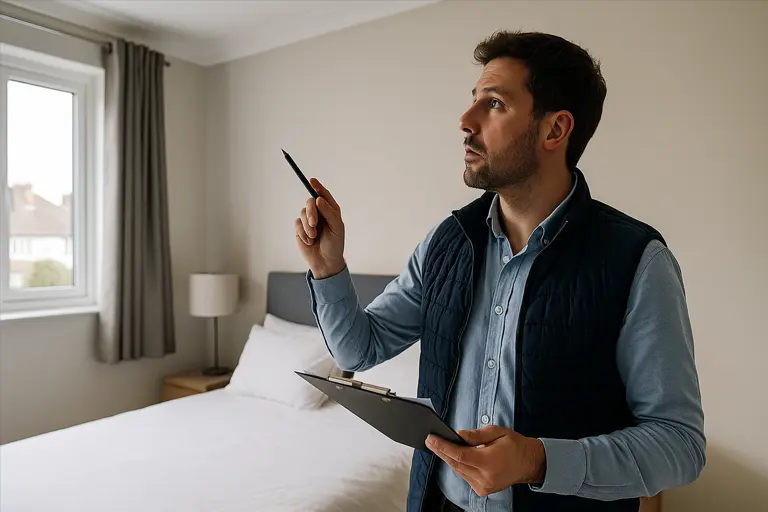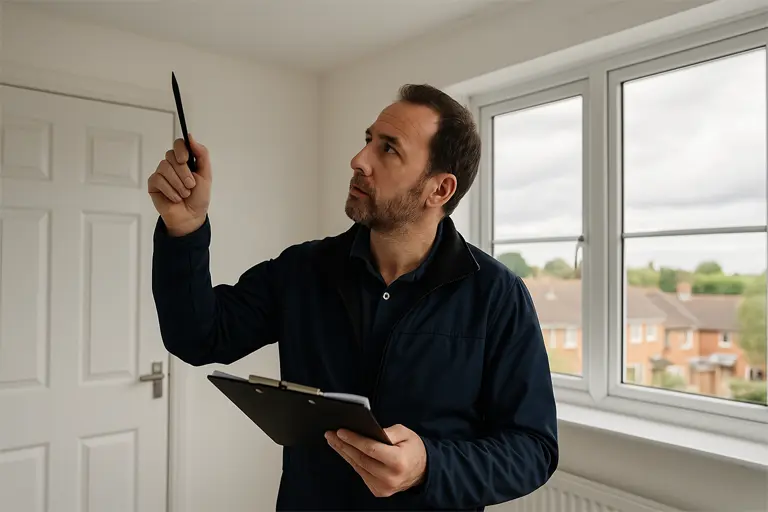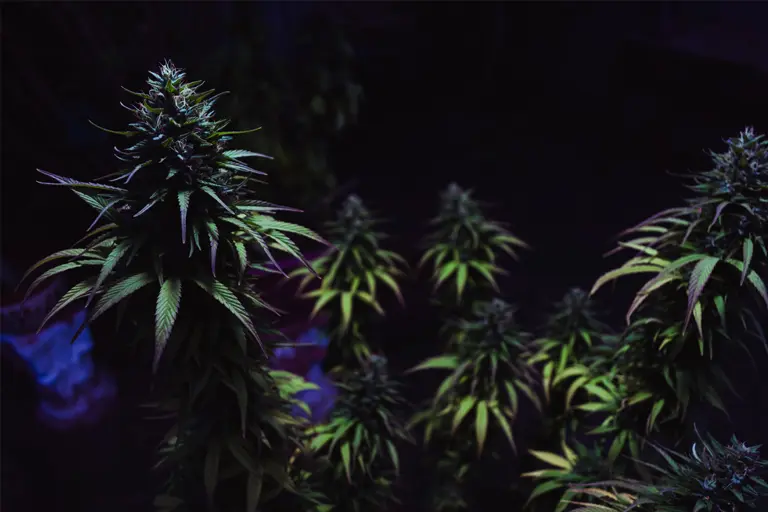When Crime Meets Claims
As a landlord, discovering that your property might be used for illegal activity is a nightmare scenario. But it’s one that’s becoming alarmingly common, especially with the rise of cannabis farms operating out of rented homes.
Organised criminal gangs are increasingly targeting rental properties, turning them into high-yield indoor cannabis operations. These setups aren’t just illegal, they’re dangerous. From electrical fires caused by bypassed meters to violent turf wars between rival gangs, the risks are real and rising.
In Greater Manchester alone, police detected over 400 cannabis farms in the last year. Many were hidden in seemingly “normal” residential homes, often undetected for months, until it was too late.
But here’s the real danger: if you suspect something is wrong and take the wrong action, you could be putting yourself, your tenants, and your insurance payout at risk.
This guide explains:
- The warning signs every landlord should look out for
- The steps to take (and avoid) if you suspect illegal cultivation
- How to protect yourself legally and financially
- And how professional inspections can provide the evidence and peace of mind you need
Knowing what to do, and doing it in the right order, is key.
Cannabis farms in rented homes don’t always look like crime scenes. In fact, many are carefully concealed behind a façade of normality. But if you know what to look for, the red flags are often there, subtle, persistent, and increasingly obvious over time.
Here are some of the most common signs:
🚪 Physical Changes
- Blacked-out or constantly covered windows, often with foil or heavy curtains
- Bright interior lights on at odd hours, sometimes 24/7
- Strong, skunky smells, especially noticeable at doors, vents, or from neighbouring properties
- High condensation on windows, even during warm weather
🔌 Electrical and Structural Tampering
- Noise from ventilation equipment (fans, extractors, humming sounds)
- Visible condensation pipes or ducting where none existed before
- Unusual power usage or tampering around the meter box
- Alterations to loft spaces or boarded-up rooms with no explanation
👤 Tenant Behaviour
- Refusal to allow inspections or consistent delays
- Cash-only rent payments
- Minimal furnishings despite long-term occupancy
- Little to no personal items or signs of ordinary living
Signs of a Cannabis Farm
| Sign | Why It’s Suspicious |
|---|---|
| Strong, skunky odours | The smell of cannabis can often be detected from outside or in shared hallways. |
| Blacked-out or covered windows | Curtains never open, windows are foiled or boarded to prevent light from escaping. |
| Constant condensation | Unusual levels of moisture on windows can indicate high humidity inside for growing. |
| Excessive ventilation or extractor noise | Loud humming or mechanical sounds suggest industrial fans or hydroponic setups. |
| Electrical meter tampering | Bypassing the meter to avoid large energy bills is common and extremely dangerous. |
| Tenant avoids inspections | Repeated cancellations or refusal to allow entry can indicate concealment. |
| Bright lights at odd hours | Unusual light activity, especially overnight, can be a red flag. |
| Frequent short visits | People regularly entering and leaving without staying may indicate illegal activity. |
It’s important to note: any one sign alone may not confirm anything. But a combination, especially when coupled with avoidance or secrecy, is a major red flag.
Next, we’ll cover why you should never confront tenants directly, even if you’re convinced something illegal is happening.
If you believe one of your rental properties is being used as a cannabis farm, your instinct may be to drive over, knock on the door, and demand answers.
Don’t.
Confronting tenants suspected of cultivating cannabis can be dangerous, and could expose you to serious legal and physical risk. Here’s why:
🛑 1. Personal Safety Risks
Cannabis farms are often operated by individuals involved in organised crime. The people inside may be:
- Armed or hostile
- Under instruction to protect the operation at all costs
- Living in dangerous conditions (tampered electrics, fire risk, structural alterations)
There have been multiple reports of “taxing” raids, where rival gangs forcibly seize farms, often involving violence. You could walk into a volatile situation with no warning.
⚖️ 2. Legal and Evidence Complications
As a landlord, you have legal responsibilities under the Protection from Eviction Act 1977 and the Housing Act 1988. If you:
- Enter the property without proper notice
- Attempt to remove tenants directly
- Confront or intimidate the
You could face legal action for harassment or unlawful eviction, even if illegal activity is taking place.
Worse, you could compromise a future police investigation or insurance claim by interfering with potential evidence.
🔍 3. You May Not Have the Full Picture
Sometimes what looks like a cannabis farm turns out to be something else entirely, such as a legitimate hydroponic grow or unusual living arrangements.
Making accusations or taking matters into your own hands could result in:
- Tenant complaints
- Civil claims
- Reputational damage
✅ What You Should Do Instead
Stay calm. Stay professional. Follow the right steps, which we’ll outline in the next section: your action plan.

Step-by-Step Action Plan for Landlords
If you’ve identified warning signs of a potential cannabis farm, the way you respond can make all the difference, legally, financially, and for your own safety.
Follow this structured approach to protect yourself and ensure the right authorities are involved from the start:
✅ 1. Do Not Enter or Confront the Tenants
Even if you’re certain something illegal is happening, do not attempt to intervene. Avoid direct confrontation or unannounced visits. You must protect your safety and stay within legal boundaries.
📸 2. Document Observations
Make a clear, dated record of everything you’ve noticed:
- Smells, noise, blocked windows, or suspicious behaviour
- Missed inspections or strange interactions
- Photographs of external signs (where safe and legal to do so)
This documentation can serve as vital evidence for authorities, insurers, and letting agents.
👮♂️ 3. Contact the Police
If you strongly suspect illegal activity, report it to your local police force on 101 or via their online reporting system.
In an emergency or if you believe someone is in immediate danger, call 999.
The police are trained to investigate safely and can begin gathering intelligence discreetly.
📢 4. Notify Your Letting Agent or Property Manager
If you use a managing agent, inform them immediately. They can:
- Flag the issue on their system
- Check tenancy records
- Liaise with tenants formally (without accusation)
This also helps establish a chain of professional due diligence.
🛠️ 5. Book a Professional Property Inspection
If you’re unsure or need formal documentation for an insurer or court case, arrange a third-party property inspection.
At Leisure Guard, our inspections include:
- Photographic evidence
- Timestamped reports
- Insurance- and police-ready documentation
🧾 6. Inform Your Insurer
Even if you’re not ready to make a claim, notifying your insurer early can help preserve your rights and prepare your case.
They may request:
- A copy of your inspection report
- Tenant referencing history
- Police reference numbers
Early disclosure shows you’re acting responsibly and transparently.
This process keeps you safe, legally protected, and in the strongest position to recover costs or damages.
Next, we’ll explore how your legal and insurance position could be affected, and what to avoid.
Read our article: Will insurance cover damage caused by a cannabis farm in my rental property?
professional Property Inspections
Stay compliant, avoid costly surprises, and protect your property from just £30 + VAT.
Get started with a free consultation today.
Legal and Insurance Considerations for Landlords
When a cannabis farm is discovered in a rental property, the legal and financial implications can be severe, not just for the individuals involved, but also for the landlord.
Here’s what you need to know about the risks to your liability, your property, and your insurance.
📜 1. You Could Be Held Responsible, Indirectly
Even if you had no knowledge of criminal activity, you may still face consequences. Under the Misuse of Drugs Act 1971, authorities can seize property that’s been used to facilitate drug production, even if the landlord is not involved.
While this is rare, it highlights the importance of acting decisively and documenting your response.
📉 2. Insurance Claims Can Be Denied
Standard landlord insurance policies often exclude malicious or illegal damage by tenants. That means:
- Fires caused by illegal wiring
- Structural damage from ventilation setups
- Theft of electricity
- Damp, mould, or rot from high humidity
…may not be covered if insurers believe you failed in your duty of care as a landlord.
Common insurer expectations include:
- Regular inspections (every 3 months)
- Evidence of tenant vetting
- Prompt response to red flags
- No negligence or “turning a blind eye”
Failing to demonstrate these can result in rejected claims, even when the damage is extensive.
🛡️ 3. The Importance of Proactive Risk Management
To reduce your liability:
- Include clear clauses in your tenancy agreement about inspections and illegal activity
- Keep formal records of all inspections and communication with tenants
- Work with trusted agents or property inspection partners
- Consider specialist landlord insurance that includes malicious damage by tenants
By understanding your obligations and taking a proactive, documented approach, you dramatically increase your chances of recovering losses and protecting your investment.
How Professional Inspections Can Help
While being a vigilant landlord is important, relying solely on your own checks can leave gaps, especially when it comes to evidence, timing, and compliance.
That’s where professional property inspections add real value, turning concern into credible documentation that protects you legally and financially.
✅ 1. Independent, Objective Evidence
A third-party inspection adds impartial weight to your concerns. It shows:
- You’re acting responsibly
- You haven’t interfered with potential evidence
- You’ve documented concerns using a qualified expert
This is crucial when dealing with insurers, police, or legal claims.
📸 2. Photo and Timestamp Documentation
Our inspection reports include:
- High-resolution photographs of all key areas
- Timestamps and location logs
- Written notes from trained inspectors
- Digital reports suitable for court or claims
This is far more robust than handwritten notes or phone photos, and far more credible.
🧾 3. Insurance & Legal Compliance
Most insurers require:
- Proof of regular inspections
- Reports showing no signs of damage or illegal use
- Clear evidence of prompt action when issues arise
Our inspections help you meet those expectations and maintain your eligibility for cover.
🔐 4. Peace of Mind Without Confrontation
Rather than confront tenants or guess what’s going on behind closed doors, professional inspections provide:
- An official record of the state of the property
- An extra deterrent to those considering illegal activity
- A way to escalate to authorities without personal risk
📦 5. Ideal for Letting Agents and Portfolio Landlords
We also work with letting agents and landlords who want:
- White-label options to offer as part of their service
- Multi-property reporting across large portfolios
- Emergency inspection callouts following tenant concerns or neighbour complaints
In short, property inspections aren’t just for compliance, they’re your front line of defence against high-risk misuse.
Read our article: The Growing Risk of Cannabis Farms in UK Rental Properties
Property inspection Service
Stay compliant, avoid costly surprises, and protect your property from just £30 + VAT.
Get started with a free consultation today.
Trust Your Instincts, Then Follow the Right Process
Cannabis farms are no longer just a problem for industrial estates or remote farms. They’re being hidden in plain sight, inside ordinary rental properties, across ordinary streets.
As a landlord, the consequences of ignoring the signs, or responding incorrectly, can be devastating:
- Physical damage to your property
- Denied insurance claims
- Legal exposure
- Serious personal risk
But with the right awareness, a cautious approach, and professional support, you can protect your property, your finances, and your reputation.
If something feels off, don’t ignore it.
Don’t confront. Don’t speculate.
Document, report, and inspect.
At Leisure Guard, our trained professionals can conduct discreet, detailed property inspections that arm you with the facts, and keep you in control.
Because protecting your property starts with knowing what’s happening inside it.
Contact Crimestoppers: https://crimestoppers-uk.org/
Misuse of Drugs Act
Frequently Asked Questions About Cannabis & Property Inspections (PIs)
What should I do first if I think my rental property is being used as a cannabis farm?
Do not confront the tenants or enter the property unannounced. Your first step should be to document what you’ve observed, then contact the police via 101. If you believe there is immediate danger, call 999.
Can I be held responsible if my tenant is growing cannabis?
While you may not be criminally liable, you can be held financially or civilly responsible, especially if you failed to inspect the property, ignored warning signs, or didn’t vet the tenant properly.
Will my landlord insurance cover damage from a cannabis farm?
Only if your policy includes malicious damage by tenants and you’ve followed your duty of care — including regular inspections and proper tenant referencing. Many claims are denied due to lack of documentation.
How do I legally document suspicious activity at my property?
Take external photos, note smells, condensation, unusual noise or wiring, and log interactions with the tenant. Do not enter the property — you could compromise evidence or put yourself at risk.
Who do I report a suspected cannabis farm to in the UK?
Report it to your local police force via 101 or use their online reporting portal. In emergencies, such as signs of fire risk or tampering, call 999.
What signs suggest a cannabis farm may be operating in a rental property?
Common signs include:
Strong smells
Blacked-out windows
Constant condensation
Unusual noise from fans or lights
Refusal of inspections
Tampered electrics or covered vents
Can I evict a tenant if I suspect illegal activity like cannabis cultivation?
You can begin legal eviction proceedings, but only after reporting to police and ensuring due process. Never attempt eviction without a court order or Section 8 notice.
Can I still make an insurance claim if I didn't do regular inspections?
It will be more difficult. Most insurers require proof that you inspected the property regularly, usually every 3 months. Without that, they may view your claim as negligent.
How can I protect my property from being used as a cannabis farm?
Thoroughly vet tenants
Include clauses in tenancy agreements about illegal activity
Conduct and document inspections
Use professional services for reporting and monitoring
Is it safe for landlords to investigate suspicious activity themselves?
No. Cannabis farms are often linked to organised crime and can pose serious fire, electrical, and personal safety risks. Always defer to the police and professionals.
What happens after the police investigate a suspected cannabis farm?
If confirmed, the police may seize evidence, arrest those involved, and secure the property. You’ll then be able to conduct a full inspection, assess damage, and begin insurance and repair processes.



